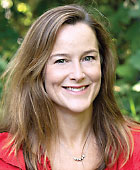Over the past several weeks, as fires have raged around Oregon, I have heard many of my colleagues’ distress: “My house might burn down. I’m so stressed, I can’t help anyone right now.” “I usually exercise to manage the stress, but I have been coughing and congested, so I haven’t exercised in a week, and I’m feeling overwhelmed.” “I have been having headaches every day from all the smoke; I’m so unproductive and behind.” “I’m just so anxious. I don’t know why, because usually I’m pretty good at handling all of this.”
I have heard these comments and others, most of them multiple times. As an integrated psychiatrist working in primary care, I hear them from primary care providers, therapists whom I supervise, and friends and colleagues in the field. I too have been experiencing most of the aforementioned symptoms. The anxiety is compounded by the dread that the worst is yet to come given the climate crisis.
Here in Oregon, the vast majority of the land is classified as rural or frontier, which includes nearly all of the communities devastated by wildfires. Beyond wildfires, rural communities are particularly affected by the climate crisis. Every year the dwindling snowpack is closely monitored with apprehension by farmers who depend on it all summer for irrigation. The heart-sickening sight of blooms on the fruit trees too early in the season has become all too common, meaning that heroic and expensive measures are required to protect the buds from frost. Farm workers and others who work outdoors are subject to more and more days of brutally hot conditions. The Columbia River water temperature more frequently rises to temperatures that salmon cannot survive, which has led, among other hazards, to extreme food shortages in recent years for indigenous populations.
Impacts to nature have direct impacts on the livelihoods and mental health of rural populations. When rural homes burn, people lose not just their homes, but farms; gardens; stockpiles of food they have canned, hunted, and fished; quilts and furniture made by hand; tools; machinery; and other necessities for subsistence.
Although the idyllic perception of rural life with beautiful scenery, close-knit communities, and cultures of resilience and self-reliance is true to some extent, it is also true that farmers have the highest rate of suicide of any occupation, a rate that has only increased in recent years. When the migration of retirees and people on disability to rural communities for various reasons—for example, low cost of housing—is added in, the rising need for social supports including mental health services in rural areas becomes evident.
To cope with these increasing burdens, rural communities often depend on limited and fragmented resources. In Oregon, some counties have no mental health therapist or just one or a lone physician assistant providing primary care. Even in less remote areas, there are rarely enough personnel to meet the overwhelming needs. Dual relationships are common. Multiple members of the same family may be limited to the same provider, which makes finding appropriate care a challenge on the best of days.
What happens when medical professionals are themselves in fight, flight, or freeze mode? They are reluctant to ask for help. We are acculturated in training to be superhuman. Most clinicians routinely defer their own needs to attend to the needs of others. In the wake of COVID-19 stress, societal divisiveness, and natural disasters, this is not sustainable. Our system needs to adapt rapidly to increasing psychological demands of caring for others while metaphorically and literally trying to keep our own houses from burning.
Oregon has funded a program called the Oregon Psychiatric Access Line (OPAL) to provide real-time psychiatric “curbside” consultation for primary care providers. As a consulting psychiatrist with OPAL in rural primary care clinics, consultative interactions can serve as touchpoints to normalize clinicians’ emotions that arise when caring for patients with complex needs or processing secondary trauma. In the wake of COVID-19, anonymous peer support has been added to the OPAL program and has proven useful as statewide wildfires exacerbate strain on providers. Programs like this and ECHO should be replicated in other states, including opportunities to educate medical professionals about the health and mental health impacts of the climate crisis so they can anticipate their own reactions and be better equipped to address the concerns with their patients.
Professional peer support should be expanded and normalized, particularly for medical professionals practicing in isolation. Employers should protect and encourage time that employees may need to participate in such activities. Even without grant support, informal networking, such as monthly call-ins for rural psychiatrists and psychiatric nurse practitioners, is helpful.
After speaking with many mental health and health care professionals who are working in fire-impacted communities with the increasing capacity for remote care, can we devise systems of “respite” for communities that have limited capacity to support providers when they need to attend to their own health and safety?
There is also a growing movement to develop community-based resilience, as reflected by the work of the International Transformational Resilience Coalition (see
“Climate Mental Wellness and Resilience Policy”). Such programs should be more consistently implemented in rural and frontier communities, as well as urban settings. Recent history has shown that such efforts can
strengthen rural communities, even after disasters. ■

